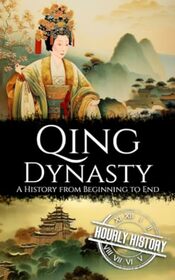The Qing Dynasty is the story of how the Manchu toppled the Han Dynasty and created a new -- and the last -- dynasty in China. The Manchus lived outside (to the northeast) of the Great Wall of China. The Hans were the largest population in China (and still are).
Considerable real estate covered the Kangxi Emperor, one of the longest rulers in history and considered one of China's most extraordinary emperors. He neutralized external conflicts and reduced internal friction between the Manchus and Hans. He brought about an era of great learning, art, and culture.
Learning about the White Lotus Societies, a group that rebelled against the Qianlong Emperor, was interesting. The Chinese thought their army and navy were formidable until the Opium Wars with Great Britain. After the first Opium War, the Chinese entered the "Century of Humiliation." The Chinese learned they could not fight Western countries with their outmoded weapons and tactics.
After catastrophic wars with Britain, France, and Japan, many Chinese formed anti-foreigner societies, such as the Society of the Righteous and Harmonious Fists (later called the Boxer Rebellion). They were against anything with a Western influence. However, they only undermined China's power.
The country was ripe for a revolution as secret societies grew and hostilities between the Manchu and Han increased. In 1911-12, the Xin Hai Revolution destabilized China.
Considerable real estate covered the Kangxi Emperor, one of the longest rulers in history and considered one of China's most extraordinary emperors. He neutralized external conflicts and reduced internal friction between the Manchus and Hans. He brought about an era of great learning, art, and culture.
Learning about the White Lotus Societies, a group that rebelled against the Qianlong Emperor, was interesting. The Chinese thought their army and navy were formidable until the Opium Wars with Great Britain. After the first Opium War, the Chinese entered the "Century of Humiliation." The Chinese learned they could not fight Western countries with their outmoded weapons and tactics.
After catastrophic wars with Britain, France, and Japan, many Chinese formed anti-foreigner societies, such as the Society of the Righteous and Harmonious Fists (later called the Boxer Rebellion). They were against anything with a Western influence. However, they only undermined China's power.
The country was ripe for a revolution as secret societies grew and hostilities between the Manchu and Han increased. In 1911-12, the Xin Hai Revolution destabilized China.




